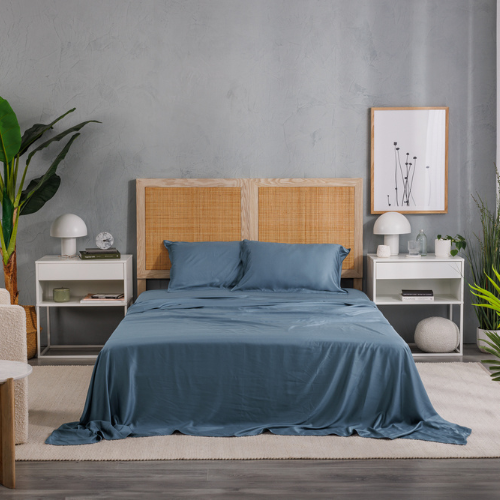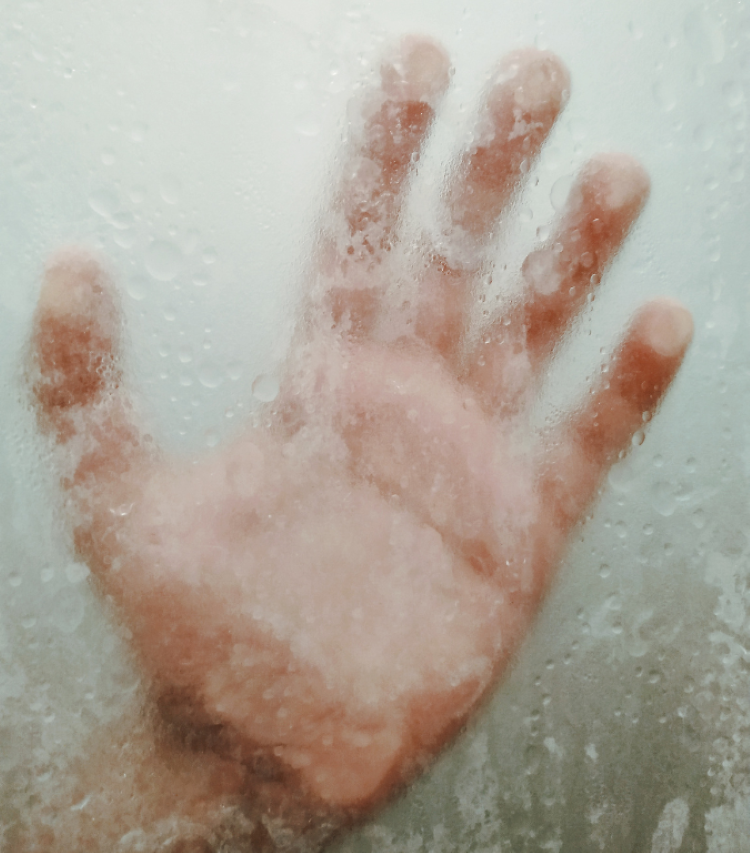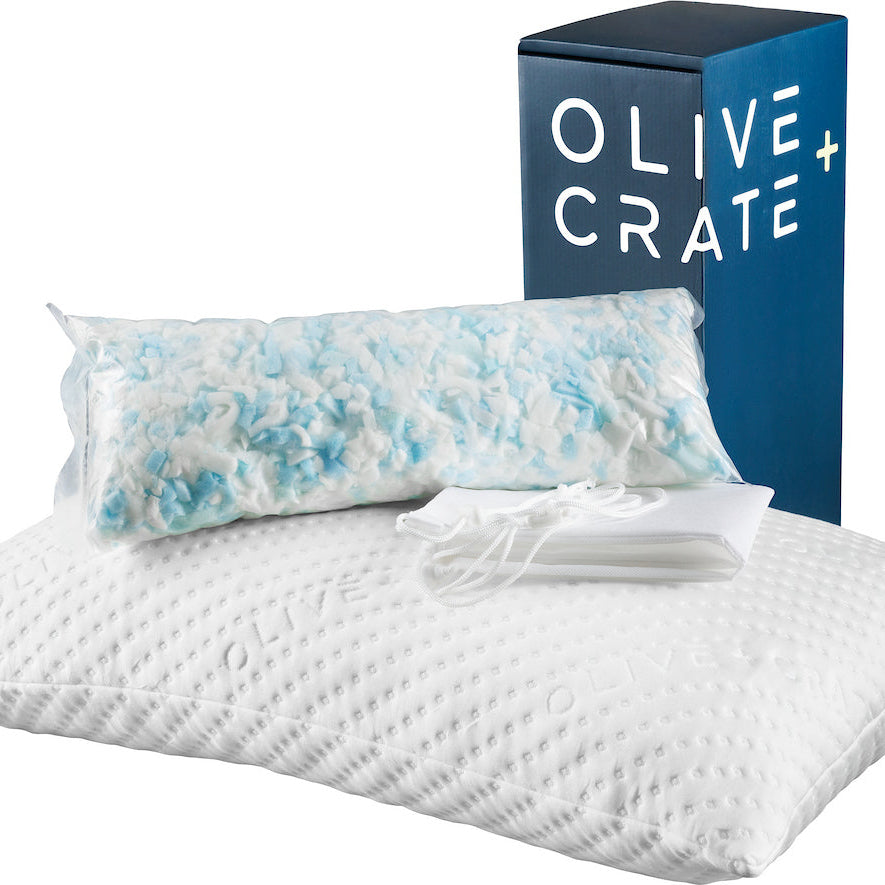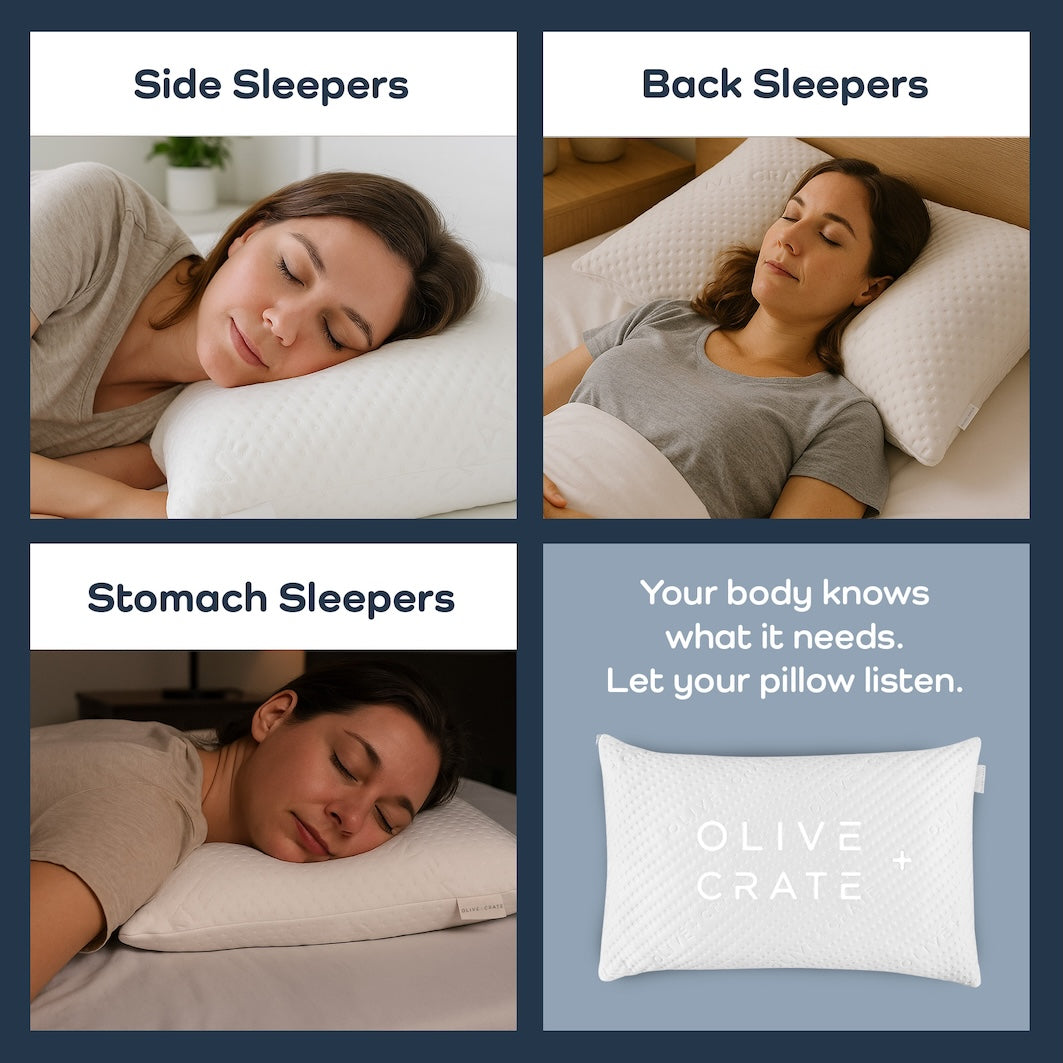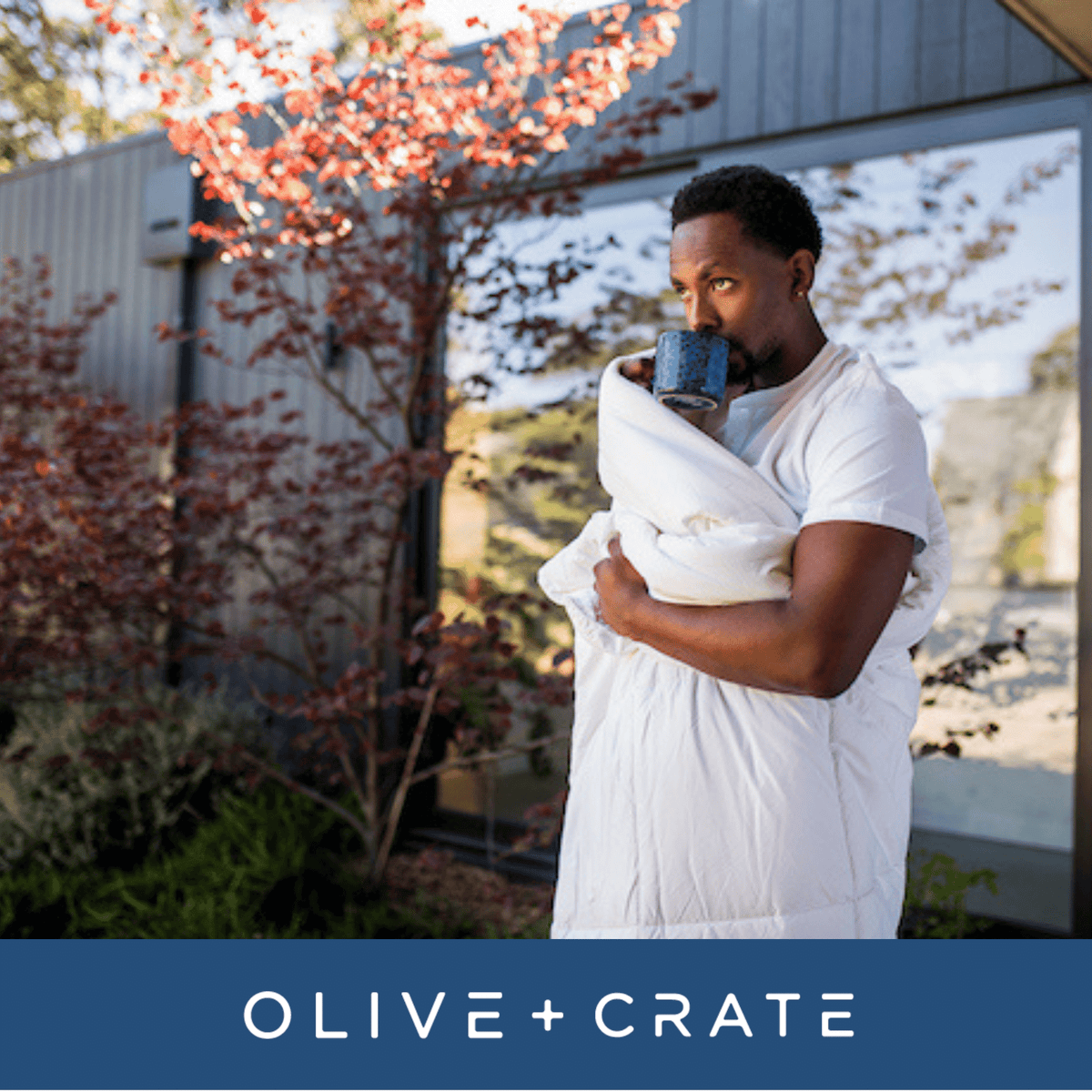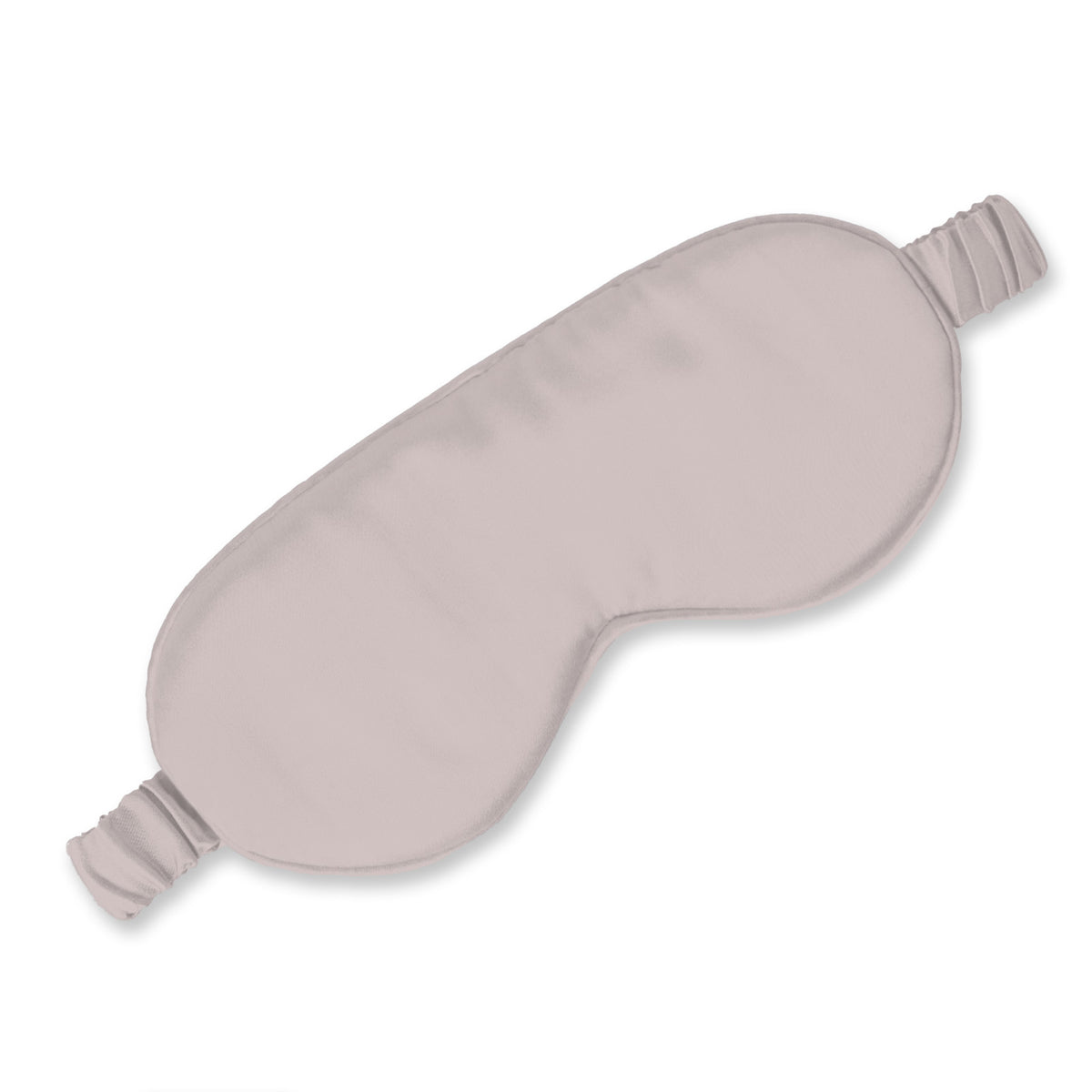Plant-derived fabrics are generally known to be less irritating to those with sensitive skin or with skin conditions. But each plant-derived fabric is different. Cotton and linen are commonly chosen as bedding for the sensitive among us, but depending on their threadcount, they may not be sufficiently breathable for those with skin sensitivity (higher thread counts means less breathability). Many also find linen feels stiff and rough on their skin, so they need something more soft and smooth.
That’s where eucalyptus bedding comes in. Tencel® sensitive skin sheets, made from the pulp of eucalyptus trees, are well known for their breathability, moisture-wicking properties, and smooth feel, which glides over the skin without causing friction and itching.
In this article, we’ll look at the common issues those with sensitive skin have with bedding, and why eucalyptus sheets, pillowcases and duvet covers offer such an appealing solution.
The problem with using the wrong sheets
Whether you have skin that’s sensitive to the feel of prickly fabrics, or you experience eczema or acne, using the wrong kind of bedding can exacerbate your discomfort when you’re in bed.
Temperature sensitivity
Some types of bedding encourage you to heat up during the night. In particular, synthetic bedding is a well-known culprit for causing overheating. Polyester or nylon sheets and pillowcases are made from petroleum-based fibres, and as anyone who’s ever worn a polyester or nylon top knows, these fabrics aren’t breathable, and when used for bedding, encourage overheating and sweating.
When you overheat in non-breathable bedding, moisture stays on your skin rather than being drawn away from your body. Also, if the bedding does take any moisture, it tends to sit on the surface of the bedding, meaning you feel clammy or wet.
There can be a number of poor outcomes that come from being inside wet, unbreathable bedding. These include:
- Itching
- Fungal skin conditions thrive
- Dust mites thrive, as they enjoy humidity. (Dust mite droppings can trigger eczema in sufferers, so it’s important to do what you can to prevent them setting up house.)
For those with sensitive skin or with skin conditions, synthetic bedding should be avoided. Instead, plant-derived bedding that is breathable and keeps you feeling dry (moisture wicking fabrics) are far better.
Thick, moisture-retaining bedding
When the fabric your bedding is made with is overly thick or in a tight weave, there’s less capacity for that fabric to breathe. It might be the very best of linen or cotton, with a high thread count, but if it’s too dense, little air gets through.
This type of bedding may trap in moisture, and create the perfect habitat for fungi and bacteria to grow. Moist sheets can also worsen skin conditions like acne and eczema. In addition, you’ll be very uncomfortable sleeping in moist sheets.
Opting for sheets that are a little more lightweight and breathable is a wise idea if you have skin sensitivity. Plant-derived, breathable and moisture-wicking bedding like cotton, linen or TENCEL ® can assist the skin to stay dry and comfortable while you sleep.
Harsh materials
There are certain fabrics that just feel irritating to those with sensitive skin. They may feel rough, stiff or prickly. Low-quality wool or linen blends, or synthetic fabrics, can feel abrasive and cause friction on the skin. This kind of friction can, on its own, cause irritation or redness on the skin. And if you scratch yourself, this only worsens, and rashes can develop. Rough seams and embroidery on your sheets or pillowcases can also cause discomfort.
Those with sensitive skin are better served by bedding that has a low-irritation feel and a smooth, seam-free surface. Fabrics like soft bamboo, well-worn linen, or Eucalyptus-derived Tencel ® all reduce friction, and are enjoyably soft.
Chemical residues in bedding
It’s all too common that people shop for bedding without considering the impact of the dyes and other chemicals used in their bedding. Sheets, duvet covers, and other bedding apparel can be treated with a range of chemical dyes, wrinkle-resistant finishes and even PFAS chemicals. These may cause temporary skin reactions like rash flare-ups, itching and dryness, but may also have longer term negative impacts on health.
For the sake of your skin, whether it’s sensitive or otherwise, it’s best to opt for bedding that is Oeko-Tex Standard 100 certified. This means it is strictly tested to ensure it’s free from harmful chemicals, and is appropriate for those with sensitive skin. (Read more about the Oeko-Tex Standard 100 certification in the FAQs below.)
Allergenic bedding
We already mentioned that dust mites love moist bedding. But other bedding materials, like synthetic filled duvets and down comforters can be appealing to dust mites, as well as being places where mould can grow. These allergens can cause skin inflammation, and serve to worsen existing skin conditions. It is better to have hypoallergenic bedding, such as Eucalyptus sheets, as they have antibacterial properties, and dust mites don’t enjoy living in them.
Note, it’s important to consider all bedding apparel, like your comforter and pillows. If possible, opt for a hypoallergenic mattress protector, which will stop dust mites entering into your mattress and a hypoallergenic comforter, if you use one (consider Olive & Crate’s Oeko-Tex Standard 100 certified bamboo waterproof mattress protector and bamboo cooling comforter for best results).
Inappropriate Cleaning Requirements
When you have sensitive skin, it’s important to use very gentle laundry detergents to wash your bedding, and you need bedding that works with that requirement. Some types of bedding require harsher cleaning detergents or fabric softeners to ensure they are comfortable enough to sleep in and odour-free. Rather than using chemicals to make your bedding softer or smell better, it is preferable at the outset to choose fabrics that are already soft to the touch and that don’t hold odours. This way you can wash them with gentle laundry products and expect good results.
Why eucalyptus sheets are a great choice for those with sensitive skin
Eucalyptus sensitive skin sheets, pillowcases and duvet covers, made of Oeko-Tex Standard 100 certified premium ultra-soft TENCEL® cooling sustainable fibre, are an excellent option for people with sensitive skin. Here’s why:
1. They feel ultra soft
The TENCEL® fibres derived from eucalyptus cellulose feel very smooth to the touch, meaning they’re gentle on your skin, rather than abrasive. Eucalyptus sheets are a luxury sheet that minimise friction. They don’t feel prickly at all, and you shouldn’t see redness or irritation on your skin.
2. They’re hypoallergenic and free from harmful chemicals
Plant-derived TENCEL® eucalyptus bedding is naturally hypoallergenic. It provides an inhospitable environment for dust mites and for mould, which means fungal skin conditions and eczema aren’t worsened by exposure to these sheets. Those that hold a Oeko-Tex Standard 100 certification are also tested for a range of other chemical allergens and known carcinogens, which means you have peace of mind knowing you’re not exposed to harmful allergens and chemicals in both the short and long term.
3. They wick moisture and are thermoregulating
Eucalyptus sheets wick moisture away from the body, which helps you feel dry during the night, rather than wet and sticky (which can feel irritating). They also help regulate your body temperature, keeping it a little warmer in winter, and a little cooler during summer. All up, those with skin sensitivity, or skin conditions like acne or eczema, have an easier time of it in eucalyptus sheets.
4. Eco-Friendly and Sustainable
Eucalyptus Tencel ® sheets are sustainably-sourced and manufactured using eco-friendly processes. So for buyers who care about the environment, purchasing Oeko-Tex Standard 100 certified eucalyptus sheets is a comforting choice from a sustainability perspective.
5. They’re durable
Provided you care properly for your eucalyptus sheets, they will last the distance. You only need mild detergents, and gentle wash cycles to care for eucalyptus bedding. And because fabric softeners aren’t required, you don’t need to deal with additional detergents in the home.
By combining comfort, safety, and sustainability, eucalyptus sensitive skin sheets made of premium TENCEL® fibre are a perfect bedding choice for sensitive skin, promoting healthier skin and better-quality sleep.
FAQs
What is the Oeko-Tex Standard 100 certification?
This is an internationally-recognised certification that verifies textiles are clear of a range of harmful chemicals, whether they be allergenic or carcinogenic.
The certification ensures that textiles are tested for over 350 known harmful substances, including:
Toxic dyes, including Azo dyes (carcinogenic) and disperse dyes (allergenic)
Heavy metals, such as Chromium (VI), Lead, Cadmium, Mercury, and Arsenic, or nickel
Allergens, such as latex and rubber
Formaldehyde
Pesticides and Herbicides
Chlorinated Compounds, and more.
Testing takes place in independent, third-party laboratories, so there is certainty that results are reliable and impartial. The same strict criteria for testing apply regardless of where the product is sold or manufactured. There is also continuing monitoring of products, to ensure ongoing compliance with the standard.
Products that receive Oeko-Tex Standard 100 certification are rated according to their safety level for those with sensitive skin, with Class 1 being the safest for baby skin. They are also manufactured responsibly and sustainably.
How often should I wash my eucalyptus sheets?
If you have sensitive skin, or allergies, it’s recommended you wash your sheets weekly. For this reason, some people choose to buy a couple of sets of eucalyptus sheets and pillowcases, so they’re not left without sheets as they wash and dry one set.
What care is involved with Eucalyptus sheets?
You can wash eucalyptus in the washing machine, however it’s recommended you wash them separate to other items. In particular, you want to avoid anything that may catch on the sheets or pull fibres, so avoid washing them with things like jeans that may have metal studs.
We advise not to use bleach or any detergents that include bleach. Only very gentle, eco-friendly laundry detergents are required with eucalyptus sheets. Always wash on a gentle cycle and choose cold water only.
When it comes to drying, you can dry on the clothesline, preferably out of direct sunlight, or else in the tumble dryer on a delicate cycle (low heat).
The better you care for these eucalyptus sheets, the longer they will last!
For more FAQs on Olive & Crate’s skin sensitive sheets, plus shipping info, click here.


